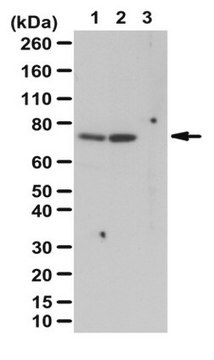ST1204
Anti-PGC-1α Rabbit pAb
liquid, Calbiochem®
Synonym(s):
PGC-1α Detection Antibody, Rabbit Anti-PGC-1α
About This Item
Recommended Products
biological source
rabbit
Quality Level
antibody form
purified antibody
antibody product type
primary antibodies
clone
polyclonal
form
liquid
does not contain
preservative
species reactivity
human, mouse, rat
manufacturer/tradename
Calbiochem®
storage condition
OK to freeze
avoid repeated freeze/thaw cycles
isotype
IgG
shipped in
wet ice
storage temp.
−70°C
target post-translational modification
unmodified
Gene Information
human ... PPARGC1A(10891)
General description
Immunogen
Application

Immunoblotting (not recommended)
Immunoprecipitation (1-2 g/100-200 g total protein)
Warning
Physical form
Analysis Note
Brown adipose tissue from mice exposed to cold
Other Notes
Zhang, Y., et al. 2009. J. Biol. Chem. 284, 32813.
Lai, L., et al. 2008. Genes Dev. 14, 1948.
Rodgers, J.T., et al. 2008. FEBS Lett. 582, 46.
Mazzucotelli, A., et al. 2007. Diabetes 10, 2467.
Nemoto, S., et al. 2005. J. Biol. Chem. 16, 16456.
Legal Information
Not finding the right product?
Try our Product Selector Tool.
Storage Class Code
12 - Non Combustible Liquids
WGK
nwg
Flash Point(F)
Not applicable
Flash Point(C)
Not applicable
Certificates of Analysis (COA)
Search for Certificates of Analysis (COA) by entering the products Lot/Batch Number. Lot and Batch Numbers can be found on a product’s label following the words ‘Lot’ or ‘Batch’.
Already Own This Product?
Find documentation for the products that you have recently purchased in the Document Library.
Our team of scientists has experience in all areas of research including Life Science, Material Science, Chemical Synthesis, Chromatography, Analytical and many others.
Contact Technical Service








